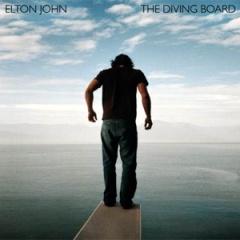Elton John - The Diving Board [2013]
Elton John - The Diving Board [2013]

1. Oceans Away 2. Oscar Wilde Gets Out 3. A Town Called Jubilee 4. The Ballad of Blind Tom 5. Dream #1 6. My Quicksand 7. Can’t Stay Alone Tonight 8. Voyeur 9. Home Again 10. Take This Dirty Water 11. Dream #2 12. The New Fever Waltz 13. Mexican Vacation (Kids In The Candlelight) 14. Dream #3 15. The Diving Board Musicians: Elton John - Composer, Piano, Vocals Jack Ashford - Tambourine Jay Bellerose - Drums George Bohanon - Euphonium, Horn (Baritone), Trombone Doyle Bramhall II - Guitar Bill Cantos - Vocals (Background) Alvin Chea - Vocals (Background) Keefus Ciancia - Keyboards Carmel Echols - Vocals (Background) Chuck Findley - Flugelhorn Bruce Fowler - Trombone Larry Goldings - Hammond B3 Stjepan Hauser - Cello Judith Hill - Vocals (Background) Darrell Leonard - Flugelhorn, Horn Arrangements, Trumpet, Trumpet (Bass) Bill Maxwell - Vocal Arrangement Perry Morgan - Vocals (Background) Ira Nepus - Trombone David Piltch - Arco Bass Louis Price - Vocals (Background) William Roper - Tuba Raphael Saadiq - Bass Rose Stone - Vocals (Background) Luka Sulic - Cello
So the story goes like this. Inspired by their work on the Leon Russell duet album The Union, producer T-Bone Burnett encouraged Elton John to return to making albums like he used to in the old days for 2013's The Diving Board, harking back to the days when he wrote quickly and recorded with little more than a rhythm section. This all sounds like a major shift in aesthetic for John, but Elton has been on a decade-long quest to tap into that old magic, beginning his voyage into the past with 2001's Songs from the West Coast and getting progressively elliptical with each subsequent release. The Diving Board does indeed evoke ghosts of Elton past but it never suggests the hits. It's an album consisting almost entirely of songs that riff on "Sixty Years On" and "Rotten Peaches" -- long, languid ballads or open-ended blues-rockers where atmosphere trumps hooks. Occasionally, Elton musters up elongated melodies that eventually catch hold, but The Diving Board isn't a collection of finely sculpted pop; it's a set of song poems and ballads, all placing emphasis on mood, not immediacy. This is an exceptional idea in theory; in practice it is ever so slightly formless, floating whenever it should be taking root. There are moments where the tempo gets ever so slightly sprightly -- "Take This Dirty Water" has a dirty gospel shuffle reminiscent of a toned-down "Take Me to the Pilot," "The Ballad of Blind Tom" is faithful to the spirit of Tumbleweed Connection, "Mexican Vacation (Kids in the Candlelight)" not only rocks but has a welcome gust of tastelessness -- but that only emphasizes just how ponderous the rest of the record is. There is much that is admirable about The Diving Board -- the feel is spacious and haunting, the ambition is commendable -- but the emphasis on tone over song means it leaves only wistful wisps of melancholia behind with the actual songs seeming like faded, distant memories. ---Stephen Thomas Erlewine, Rovi
Mistrz ekscentryzmu Elton John od lat niczego nie musi udowadniać. Nie tylko dlatego jego 30. solowy album "The Diving Board" to wyjątkowo dobry materiał.
"The Diving Board” jest pierwszym krążkiem od wydanego w 1979 r. „Victim of Love”, w którym nie wzięli udziału członkowie jego regularnego bandu. To pokaz kunsztu samego Eltona Johna, choć od razu trzeba zaznaczyć bardzo ważne role autora genialnych tekstów Berniego Taupina oraz producenta T-Bone Burnetta. Nagranym głównie w towarzystwie fortepianu albumem Elton nie próbuje mizdrzyć się do młodej widowni, do list przebojów. Oczywiście John świadomy jest tego, co obecnie dzieje się w muzyce, inspiruje go praca chociażby z Eminemem i Kanye Westem, ale jak sam przyznaje: „To płyta 66-letniego faceta, a nie 26-latka nagrywającego przebój »Rocket Man«. Piosenki są dojrzałe i refleksyjne. Zmieniłem się”. Trudno nie przyznać mu racji. „The Diving Board” jest krążkiem przemyślanym, mieszającym bluesa, gospel oraz country i skutecznie ilustrującym klasę Eltona jako pianisty i wokalisty. A wspomniani współtwórcy „The Diving Board”? Berniego Taupina muzyk spotkał już pod koniec lat 60. Gazeta „New Musical Express” zorganizowała wtedy konkurs dla autorów tekstów. Berniego dojrzał wydawca Eltona i skojarzył obu panów. Duet doskonale się dogadał, co owocowało przez lata. Stworzyli razem takie przeboje, jak „Rocket Man”, „Crocodile Rock”, „Candle in the Wind”, „Don’t Let the Sun Go Down on Me”, „Your Song” i „I’m Still Standing”. Bernie pisał też m.in. dla Alice’a Coopera i Williego Nelsona. Jest poza tym autorem słów do piosenki „A Love That Will Never Grow Old” z filmu „Brokeback Mountain”, za którą w 2006 r. otrzymał nagrodę Złoty Glob. Próbował również sił jako wokalista. Słuchając Eltona śpiewającego jego teksty, można odnieść wrażenie, że Bernie doskonale odczytuje intencje muzyka, wciela się w niego. To podobna chemia do tej, która towarzyszy na przykład Martinowi Gore’owi i Davidowi Gahanowi z Depeche Mode. Na „The Diving Board” Elton śpiewa o tęsknocie do swoich rodzinnych stron, przemijaniu, pokusach młodości (z których wiele przecież sam doświadczył). Bez nadęcia, dojrzale i z wyczuciem. --- Wojciech Przylipiak, kultura.gazetaprawna.pl
Last Updated (Monday, 09 January 2017 17:00)








